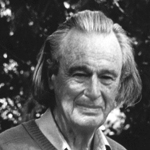Derek Freeman
| John Derek Freeman | |
|---|---|

Derek Freeman
|
|
| Born |
15 August 1916 Wellington, New Zealand |
| Died | 6 July 2001 (aged 84) Canberra, Australia |
| Occupation | Anthropologist |
| Spouse(s) | Monica Maitland |
John Derek Freeman (15 August 1916 – 6 July 2001) was a New Zealand anthropologist best known for his criticism of Margaret Mead's work on Samoan society, as described in her 1928 ethnography Coming of Age in Samoa. His effort "ignited controversy of a scale, visibility, and ferocity never before seen in anthropology."
Freeman initially became interested in Boasian cultural anthropology while an undergraduate in Wellington, and later went to live and work as a teacher in Samoa. After entering the New Zealand Naval Reserve in World War II, he did graduate training with British social anthropologists Meyer Fortes and Raymond Firth at London School of Economics. He did two and a half years of fieldwork in Borneo studying the Iban people. His 1953 doctoral dissertation described the relations between Iban agriculture and kinship practices. Returning to Borneo in 1961 he suffered a nervous breakdown induced by an intense rivalry with ethnologist and explorer Tom Harrisson. This experience profoundly altered his view of anthropology, changing his interests to looking at the ways in which human behavior is influenced by universal psychological and biological foundations. From then on Freeman argued strongly for a new approach to anthropology which integrated insights from evolutionary theory and psychoanalysis, and he published works on the concepts of aggression and choice.
This new interest in biological and psychological universals lead him to take issue with the famous American anthropologist Margaret Mead who had described Samoan adolescents as not suffering from the "coming of age" crisis which was commonly thought to be universal when the study was published in 1923. Mead argued that the lack of this crisis in Samoan adolescence was caused by the youths' greater degree of sexual freedom, and that adolescence crises were therefore not universal, but culturally conditioned. In 1966-67 Freeman conducted fieldwork in Samoa, trying to find Mead's original informants, and while visiting the community where Mead had worked he experienced another breakdown. In 1983 Freeman published his book Margaret Mead and Samoa: The Making and Unmaking of an Anthropological Myth in which he argued that Mead's data and conclusions were wrong and that Samoan youths suffered from the same problems as Western adolescents. He also argued that Samoan culture in fact put greater emphasis on female virginity than Western culture and had higher indices of juvenile delinquency, sexual violence and suicide. He later published "The Fateful Hoaxing of Margaret Mead" in which he argued that Mead's misunderstandings of Samoan culture were due to her having been hoaxed by two of her female Samoan informants, who had merely joked about sexual escapades that they did not in fact have.
...
Wikipedia
